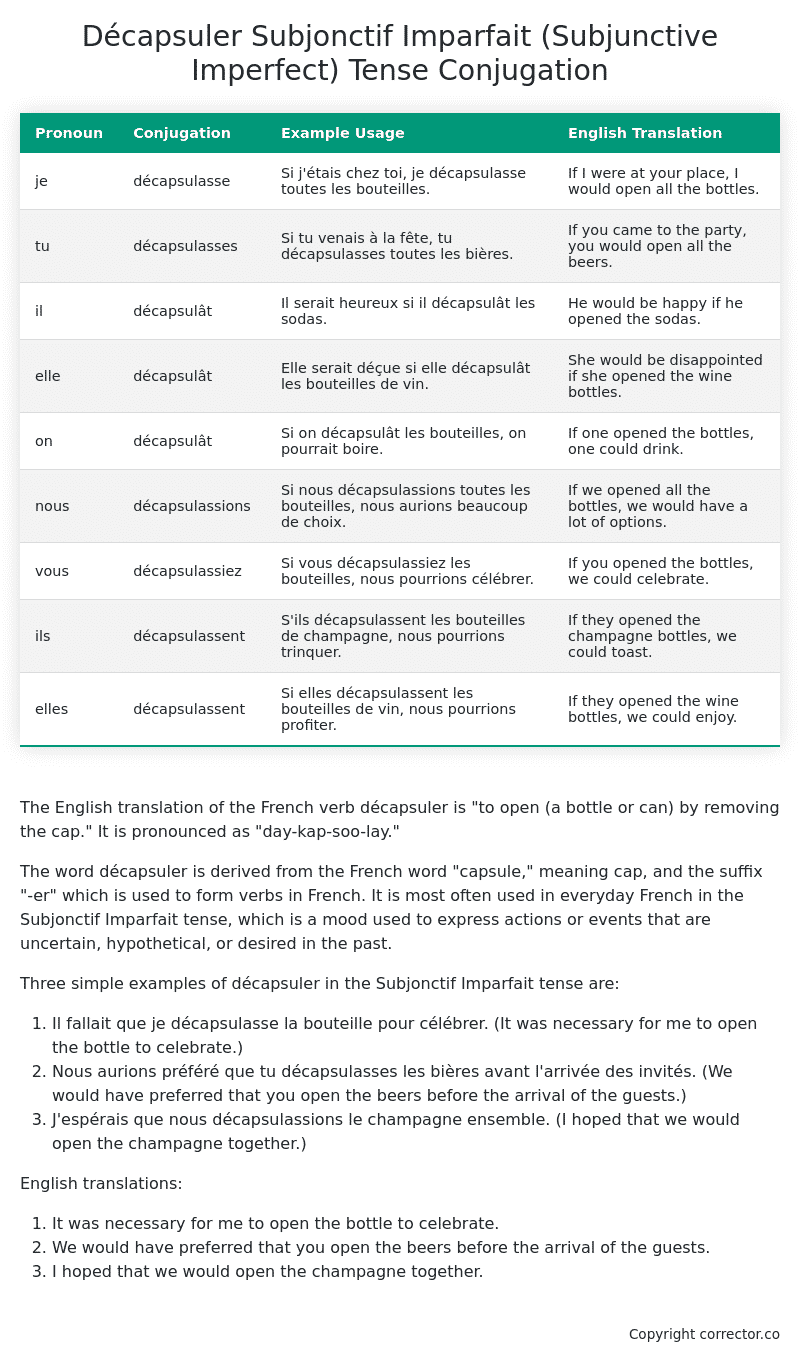Subjonctif Imparfait (Subjunctive Imperfect) Tense Conjugation of the French Verb décapsuler
Introduction to the verb décapsuler
The English translation of the French verb décapsuler is “to open (a bottle or can) by removing the cap.” It is pronounced as “day-kap-soo-lay.”
The word décapsuler is derived from the French word “capsule,” meaning cap, and the suffix “-er” which is used to form verbs in French. It is most often used in everyday French in the Subjonctif Imparfait tense, which is a mood used to express actions or events that are uncertain, hypothetical, or desired in the past.
Three simple examples of décapsuler in the Subjonctif Imparfait tense are:
- Il fallait que je décapsulasse la bouteille pour célébrer. (It was necessary for me to open the bottle to celebrate.)
- Nous aurions préféré que tu décapsulasses les bières avant l’arrivée des invités. (We would have preferred that you open the beers before the arrival of the guests.)
- J’espérais que nous décapsulassions le champagne ensemble. (I hoped that we would open the champagne together.)
English translations:
- It was necessary for me to open the bottle to celebrate.
- We would have preferred that you open the beers before the arrival of the guests.
- I hoped that we would open the champagne together.
Table of the Subjonctif Imparfait (Subjunctive Imperfect) Tense Conjugation of décapsuler
| Pronoun | Conjugation | Example Usage | English Translation |
|---|---|---|---|
| je | décapsulasse | Si j’étais chez toi, je décapsulasse toutes les bouteilles. | If I were at your place, I would open all the bottles. |
| tu | décapsulasses | Si tu venais à la fête, tu décapsulasses toutes les bières. | If you came to the party, you would open all the beers. |
| il | décapsulât | Il serait heureux si il décapsulât les sodas. | He would be happy if he opened the sodas. |
| elle | décapsulât | Elle serait déçue si elle décapsulât les bouteilles de vin. | She would be disappointed if she opened the wine bottles. |
| on | décapsulât | Si on décapsulât les bouteilles, on pourrait boire. | If one opened the bottles, one could drink. |
| nous | décapsulassions | Si nous décapsulassions toutes les bouteilles, nous aurions beaucoup de choix. | If we opened all the bottles, we would have a lot of options. |
| vous | décapsulassiez | Si vous décapsulassiez les bouteilles, nous pourrions célébrer. | If you opened the bottles, we could celebrate. |
| ils | décapsulassent | S’ils décapsulassent les bouteilles de champagne, nous pourrions trinquer. | If they opened the champagne bottles, we could toast. |
| elles | décapsulassent | Si elles décapsulassent les bouteilles de vin, nous pourrions profiter. | If they opened the wine bottles, we could enjoy. |
Other Conjugations for Décapsuler.
Le Present (Present Tense) Conjugation of the French Verb décapsuler
Imparfait (Imperfect) Tense Conjugation of the French Verb décapsuler
Passé Simple (Simple Past) Tense Conjugation of the French Verb décapsuler
Passé Composé (Present Perfect) Tense Conjugation of the French Verb décapsuler
Futur Simple (Simple Future) Tense Conjugation of the French Verb décapsuler
Futur Proche (Near Future) Tense Conjugation of the French Verb décapsuler
Plus-que-parfait (Pluperfect) Tense Conjugation of the French Verb décapsuler
Passé Antérieur (Past Anterior) Tense Conjugation of the French Verb décapsuler
Futur Antérieur (Future Anterior) Tense Conjugation of the French Verb décapsuler
Subjonctif Présent (Subjunctive Present) Tense Conjugation of the French Verb décapsuler
Subjonctif Passé (Subjunctive Past) Tense Conjugation of the French Verb décapsuler
Subjonctif Imparfait (Subjunctive Imperfect) Tense Conjugation of the French Verb décapsuler (this article)
Subjonctif Plus-que-parfait (Subjunctive Pluperfect) Tense Conjugation of the French Verb décapsuler
Conditionnel Présent (Conditional Present) Tense Conjugation of the French Verb décapsuler
Conditionnel Passé (Conditional Past) Tense Conjugation of the French Verb décapsuler
L’impératif Présent (Imperative Present) Tense Conjugation of the French Verb décapsuler
L’infinitif Présent (Infinitive Present) Tense Conjugation of the French Verb décapsuler
Struggling with French verbs or the language in general? Why not use our free French Grammar Checker – no registration required!
Get a FREE Download Study Sheet of this Conjugation 🔥
Simply right click the image below, click “save image” and get your free reference for the décapsuler Subjonctif Imparfait tense conjugation!

Décapsuler – About the French Subjonctif Imparfait (Subjunctive Imperfect) Tense
Formation
Common Everyday Usage Patterns
Interactions with Other Tenses
Subjonctif Présent
Indicatif Passé Composé
Conditional
Conditional Perfect
Summary
I hope you enjoyed this article on the verb décapsuler. Still in a learning mood? Check out another TOTALLY random French verb conjugation!


